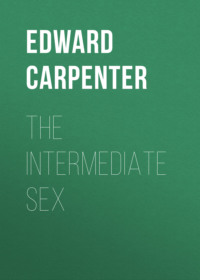
The Intermediate Sex
Конец ознакомительного фрагмента.
Текст предоставлен ООО «ЛитРес».
Прочитайте эту книгу целиком, купив полную легальную версию на ЛитРес.
Безопасно оплатить книгу можно банковской картой Visa, MasterCard, Maestro, со счета мобильного телефона, с платежного терминала, в салоне МТС или Связной, через PayPal, WebMoney, Яндекс.Деньги, QIWI Кошелек, бонусными картами или другим удобным Вам способом.
1
For the derivation of these terms see ch. ii., p. 20, infra.
2
See Appendix, pp. 139 and 140.
3
From Uranos, heaven; his idea being that the Uranian love was of a higher order than the ordinary attachment. For further about Ulrichs and his theories see Appendix, pp. 157-159.
4
Charles G. Leland (“Hans Breitmann”) in his book “The Alternate Sex” (Wellby, 1904), insists much on the frequent combination of the characteristics of both sexes in remarkable men and women, and has a chapter on “The Female Mind in Man,” and another on “The Male Intellect in Woman.”
5
Some late statistical inquiries (see “Statistische Untersuchungen,” von Dr. M. Hirschfeld, Leipzig, 1904) yield 1.5 to 2.0 per cent. as a probable ratio. See also Appendix, pp. 134-136.
6
For instances, see Appendix, pp. 149-153.
7
See De Joux, “Die Enterbten des Liebesglückes” (Leipzig, 1893), p. 21.
8
“Psychopathia Sexualis,” 7th ed., p. 276.
9
See Appendix, pp. 153-156.
10
A good deal in this description may remind readers of history of the habits and character of Henry III. of France.
11
Perhaps, like Queen Christine of Sweden, who rode across Europe, on her visit to Italy, in jack-boots and sitting astride of her horse. It is said that she shook the Pope’s hand, on seeing him, so heartily that the doctor had to attend to it afterwards!
12
“Homosexual,” generally used in scientific works, is of course a bastard word. “Homogenic” has been suggested, as being from two roots, both Greek, i.e., “homos,” same, and “genos,” sex.
13
“Athenæus” xiii., ch. 78.
14
See Plutarch’s “Eroticus,” §xvii.
15
See “Natural History of Man,” by J. G. Wood. Vol: “Africa,” p. 419.
16
See also Livingstone’s “Expedition to the Zambesi” (Murray, 1865) p. 148.
17
Though these two plays, except for some quotations, are lost.
18
Mantegazza and Lombroso. See Albert Moll, “Conträre Sexualempfindung,” 2nd ed., p. 36.
19
Though in translation this fact is often by pious fraudulence disguised.
20
W. Pater’s “Renaissance,” pp. 8-16.
21
Among prose writers of this period, Montaigne, whose treatment of the subject is enthusiastic and unequivocal, should not be overlooked. See Hazlitt’s “Montaigne,” ch. xxvii.
22
I may be excused for quoting here the sonnet No. 54, from J. A. Symonds’ translation of the sonnets of Michel Angelo:—
“From thy fair face I learn, O my loved lord,That which no mortal tongue can rightly say:The soul, imprisoned in her house of clay,Holpen by thee to God hath often soared:And though the vulgar, vain, malignant hordeAttribute what their grosser wills obey,Yet shall this fervent homage that I pay,This love, this faith, pure joys for us afford,Lo, all the lovely things we find on earth,Resemble for the soul that rightly sees,That source of bliss divine which gave us birth:Nor have we first-fruits or remembrancesOf heaven elsewhere. Thus, loving loyally,I rise to God, and make death sweet by thee.”The labours of von Scheffler, followed by J. A. Symonds, have now pretty conclusively established the pious frauds of the nephew, and the fact that the love-poems of the elder Michel Angelo were, for the most part, written to male friends.
23
See an interesting paper in W. Pater’s “Renaissance.”
24
For a fuller collection of instances of this Friendship-love in the history of the world, see “Ioläus: an Anthology,” by E. Carpenter (George Allen, London. 3/– net). Also “Liebling-minne und Freundesliebe in der Welt-literatur,” von Elisar von Kupffer (Adolf Brand, Berlin, 1900).
25
As in the case, for instance, of Tennyson’s “In Memoriam,” for which the poet was soundly rated by the Times at the time of its publication.
26
Jowett’s “Plato,” 2nd ed., vol. ii., p. 30.
27
Jowett, vol. ii., p. 130.
Вы ознакомились с фрагментом книги.
Для бесплатного чтения открыта только часть текста.
Приобретайте полный текст книги у нашего партнера:
Полная версия книги
